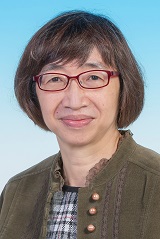
Joyce Lee teaches English for academic purposes and technical communication. In recent years, she has also been involved in the development of the English curriculum for engineering students. Prior to joining HKUST, she taught at local secondary schools and the Hang Seng School of Commerce. She has also worked as a translator in the commercial sector.
Professional Interests
Joyce has been involved in materials development, self-access learning, teacher training and multi-media materials production. Her recent interests are mainly in materials writing and linguistic proficiency development.
Scholarship
Developing specific and transferable skills for professional communication in engineering
Carmichael, Sarah; Lee, Yuen Yee; Au, Chui Han Anita; Wong, Grace Hoi Yee
ISBN: 9781032148007
Source: Best Practices in English Teaching and Learning in Higher Education: Lessons from Hong Kong for Global Practice / edited by Lillian L. C. Wong. London : Routledge, 2024, p. 168-181
Undergraduate engineering programmes worldwide aim to equip their graduates with specialised skills applicable to a career in the discipline. These programmes increasingly include instruction in professional communication skills by language educators. Engineering faculty often request that students be instructed in discipline-specific professional skills, while universities may expect graduates to have developed a broad range of transferable skills, often expressed as ‘graduate attributes’. Language educators developing professional communication courses for engineering students need to consider how specific their instruction should be, given that the communication needs of engineers will change as they transition from frontline technical roles to managerial positions when ascending the career ladder. This chapter presents four best practices for the design of professional communication courses for engineering students, based on the experience of course developers in the Hong Kong University of Science and Technology. These principles attempt to meet the expectations of subject faculty that their students will learn discipline-specific professional skills, whilst addressing the longer-term communication needs of engineers. These four best practices are likely to be relevant to other language educators facing a similar mix of expectations and requests from subject faculty and academic leaders in their own institutions.
Syntactic complexity and writing quality in students' technical writing
Lee, Yuen Yee; Wu, Kam Yin; Lee, Ping Chung Eric
Syntactic complexity is a crucial aspect of linguistic proficiency and thus understanding and supporting such development in learners is a keen concern for language teachers. Research conducted has shown growing sophistication of noun phrase structures by writers of different abilities in academic writing (Biber & Gray, 2010; Liu & Li, 2016; Parkinson & Musgrave, 2014). In comparison, relatively less is known about the development of syntactic sophistication among student technical writers. Adopting a discipline-specific approach, this study compared the complexity of noun phrase structures in student texts of three performance levels from high, mid and low. The data taken from 45 technical reports of university engineering students were analyzed quantitatively using automatic syntactic analyzers and qualitatively by manual coding and text examination. The results show that noun phrase complexity is a differentiating factor for different performance levels with the stronger texts exemplifying more varied modifying structures and in greater numbers. Complex and lengthy structures, such as multiple use of prepositional phrases and combined use of other modifiers such as -ed or -ing clauses, are common in postmodification, whereas premodifying structures are simpler in structure and shorter. The study also explored the contribution of complex noun phrases to expression of meaning, showing that complex syntactic structures are commonly used to perform a diverse range of language functions essential to technical communication, such as explaining a scientific mechanism. The close connection between syntactic complexity and expression of meaning suggests that structures for pre- and postmodification should be learned as a meaning-making resource.
Syntactic complexity and writing quality in students’ technical writing
Lee, Joyce Yuen Yee; Wu, Kam Yin
Teaching professional communication skills to engineering students
Carmichael, Sarah; Lee, Yuen Yee; Au, Chui Han Anita; Wong, Grace Hoi Yee
Language curriculum design for engineering students: How specific can it be?
Carmichael, Sarah; Wu, Kam Yin; Lee, Yuen Yee
The final stage of curriculum innovation for the four year degree program at The Hong Kong University of Science and Technology was the development of specialized department-based English courses for senior undergraduate students in the School of Engineering. These students are in their fourth year of study and have built up considerable subject expertise. The Center for Language Education has developed four such courses for Computer Science, Electrical Engineering, Industrial Engineering and Civil Engineering. All these courses include an academic component, preparing students to write and present on their Final Year Project, as well as a professional communication component, but all have to be tailored to the specific academic requirements of the department, and cater for differing professional contexts after graduation. We report on some of the issuesinvolved and the challengesfaced, in designing specialized courses, using authentic materials, to meet specific purposes. Questions which arose included: how specific should the materials be given that within the same department, academic projects may be extremely varied? How should we handle professional communication, given that students may enter a variety of occupations after graduation? Our resolution of such issues may be applicable to curriculum developers facing similar challenges in other institutions.
Designing and Evaluating a Genre-based Technical Communication Course Incorporating a Task-based Model of Instruction
Carmichael, Sarah; Wu, Kam Yin; Lee, Yuen Yee Joyce
The universal introduction of a four-year curriculum for undergraduates in Hong Kong has necessitated the development of new types of courses that build on general EAP training in preparing students progressively for the specific language demands of their discipline. This important work has attracted much attention, but reports on the conceptualization of the new courses and their effectiveness have only begun to emerge. This paper discusses how a new genre-based technical communication course at HKUST aims to enable novice engineering students to function effectively in their academic studies through the adoption of a task-based learning framework which exposes students to a careful selection of genres and lexico-grammatical features. The course was piloted with 230 students, and an evaluation study was conducted using triangulated data from course surveys, focus group discussions, and textual analysis of students’ writing. Preliminary results suggest that the course has helped students to acquire the skills for writing a technical description using an appropriate writing style. Students have also learned to use technical words in contextually meaningfully ways. However, they were less successful in writing the introduction to a technical report. These findings are discussed in relation to the students’ prior learning experiences.

